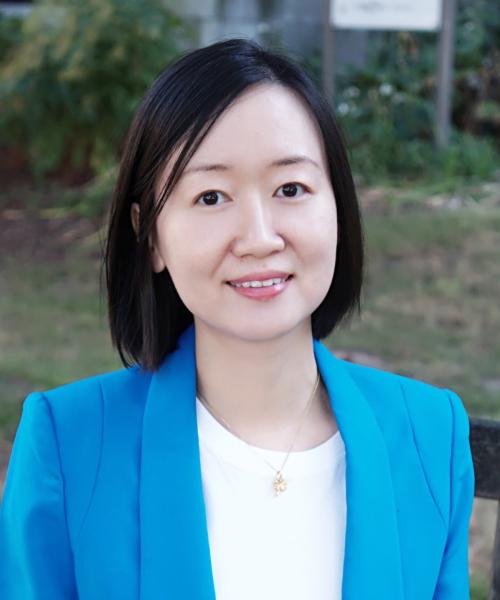
Additional Appointments
Affiliate Faculty, Center for Statistics and the Social Sciences
Research Interests
Chun Wang
Areas of Interest
- Multilevel/multidimensional/mixture Item response theory (IRT) models for survey item responses (e.g., Likert scales, nominal responses, performance scales), with applications in achievement testing, aptitude testing, personality assessment, and health measurement, etc.
- Development of new scales/instruments
- Refinement and validation of scales (e.g., check for measurement invariance across different cultures, groups, time, etc.)
- Evaluation of generative AI (GenAI) and large language models (LLMs)
- Computerized adaptive testing (CAT) and applications
- Cognitive diagnostic modeling and applications in classroom assessment and learning
- General statistical methods and applications including adaptive design, longitudinal models, etc.
I am currently accepting doctoral students in the Measurement & Statistics Program.
Multimedia
My scientific career starts in the field of educational and psychological measurement, and in recent years gradually pivots to the emerging intersection between measurement and data science. The goal of this gradual transition is to leverage artificial intelligence (AI) and machine learning (ML)-based psychometric tools to produce assessments that are reliable and secure, fair, inclusive, and provide interpretable diagnostic feedback. I served as a member on the Design and Assessment Committee (DAC) of National Assessment of Educational Progress (NAEP) since 2017, and I was the editor-in-chief for the Journal of Educational Measurement between 2022-2025. My work is funded by federal grants from Institute of Education Sciences, National Science Foundation, National Institute of Health, and private companies such as McGraw-Hill, Pearson, and Duolingo.
My main line of work spans three interrelated strands, each of which has roots in item response theory (IRT). They are: (1) developing computerized adaptive testing (CAT) for measuring multifaceted constructs; (2) expanding cognitive diagnostic models to move the needle on formative use of diagnostic assessment in the classroom and at scale, and to explore complex dynamics of student learning that are essential to scalable, individualized, and adaptive instruction; and (3) proposing new models and methods for analyzing both micro level (e.g., item level response time, intra-individual level data) and macro level (e.g., population level longitudinal data) assessment data to accommodate idiosyncratic data structure and analysis needs.
My recent work is inspired by and will fuel cross pollution between psychometrics and AI. On one hand, I use modern AI techniques to discover complex patterns from massive, heterogeneous, and irregular data such as Electronic Health Record (EHR) data. Meanwhile, I also develop novel psychometric models to better evaluate GenAI models’ performance across diverse contexts (e.g., multilingual, multiple prompt).
2025, Significant Contributions to Research Methodology Award (Measurement, Psychometrics, and Assessment), American Educational Research Association, Division D
2025, Bradley Hanson Award for Contributions to Educational Measurement, National Council on Measurement in Education
2022, Outstanding Service Award, National Council on Measurement in Education
2020, Anne Anastasi Distinguished Early Career Contributions Award (American Psychological Association, Division 5)
2018, 2019, Best Reviewer Award for Psychometrika (Psychometric Society)
2017, McKnight Presidential Fellow, University of Minnesota
2017, Early Career Award, Psychometric Society
2016, Best Reviewer Award for Psychometrika (Psychometric Society)
2016, Outstanding Reviewer Award for Journal of Educational and Behavioral Statistics (AERA & ASA)
2015, Early Career Award, AERA Division D (Quantitative Research Methodology)
2014, Early Career Award, International Association for Computerized Adaptive Testing
2014, Post-doctoral Fellow, National Academy of Education/Spencer Foundation
2014, Jason Millman Promising Measurement Scholar Award, NCME
2013, State-of-the-Art Lecturer Award, Psychometric Society
2013, Alicia Cascallar Best Paper Award, NCME
Selected latest articles
* indicate student advised or co-advised
† corresponding author other than the first author
Wang, C. (2024). A diagnostic facet status model (DFSM) for extracting instructionally useful information from diagnostic assessment. Psychometrika.
Cui, C.* , Wang, C.†, & Xu, G.† (2024). Variational Estimation for Multidimensional Generalized Partial Credit Model. Psychometrika.
Wang, C., Zhu, R.* , Crane, P., Choi, S., Jones, R., & Tommet, D. (2024). Using Bayesian IRT for multi-cohort repeated measure design to estimate individual latent change scores. Psychological Methods.
Cho, A.* , Xiao, J.*, Wang, C.†, & Xu, G.† (2023). Regularized variational estimation for exploratory item factor analysis. Psychometrika.
Wang, C., Zhu, R.*, & Xu, G. (2022). Using lasso and adaptive lasso to identify DIF in multidimensional 2PL models. Multivariate Behavioral Research
Wang, C. (2021). Using penalized EM algorithm to infer learning trajectories in latent transition CDM. Psychometrika.
Google Scholar page
https://scholar.google.com/citations?user=6j3ABHUAAAAJ&hl=en